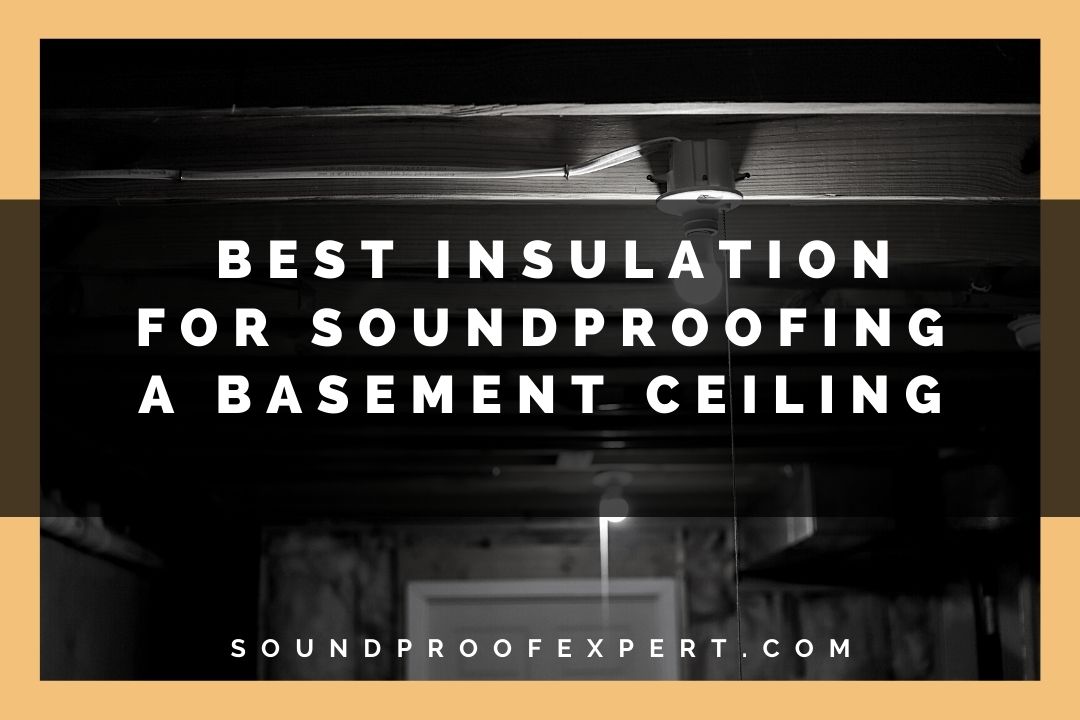
The basement may be a place to store excess furniture and other items, but you can use it for many things. If you need to make noise in your basement, you should consider soundproofing the ceiling.
And luckily, you can use insulation to do just that.
The best insulation for soundproofing a basement ceiling is fiberglass. Fiberglass is useful because it’s both an effective insulator and an effective soundproofing material. Some of the most reliable companies selling fiberglass insulation include Owens Corning and Johns Manville.
If you want to insulate and soundproof the ceiling of your basement, you can do that with one product. So you don’t have to spend as much time installing everything. But before you start, consider the best insulation for soundproofing your basement ceiling.
Why Insulation is Good for Soundproofing Ceilings
Soundproofing a basement ceiling is useful if you want to set up a basement recording studio. It can also help if you want to rent out your basement and don’t want the sound to bleed to the rest of your house. Consider the current state of your basement before you start soundproofing.
You can use a few methods to soundproof a ceiling, and insulation is an excellent choice. It’s relatively easy to install, and it doesn’t cost too much. You can use it either on its own or along with acoustic tiles or drywall.
Insulation works well if you have exposed joists in your basement. You can install a batt of insulation, but you should make sure the insulation you choose will work well for soundproofing.
Why Use Fiberglass?
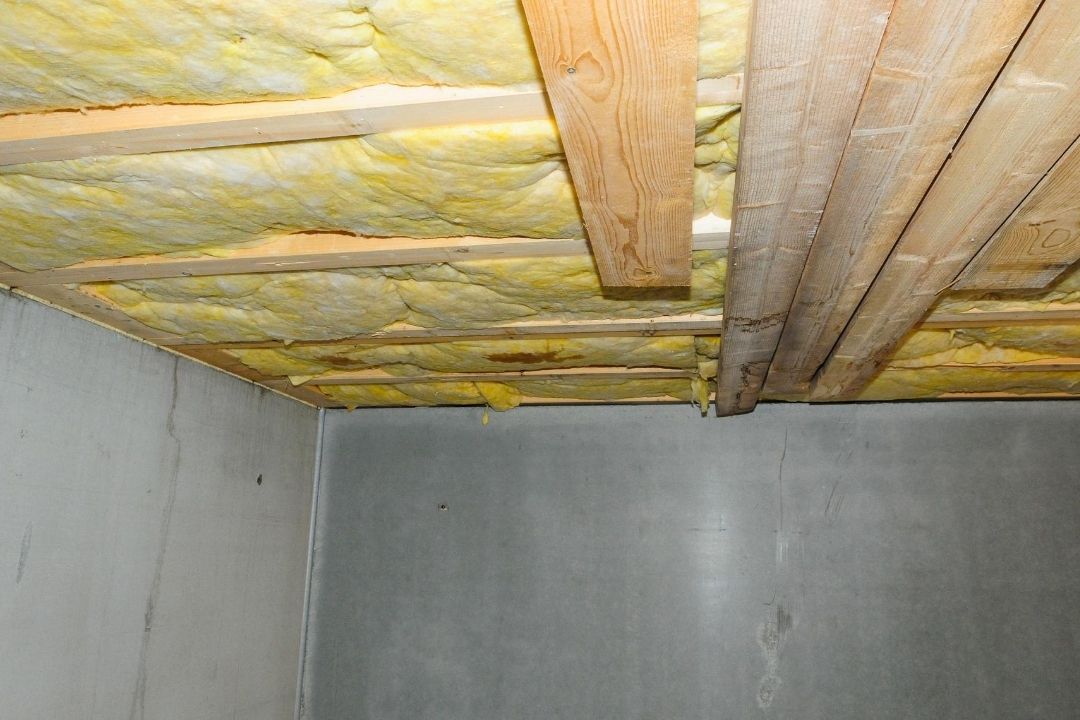
When choosing the best insulation for soundproofing a basement ceiling, look for fiberglass insulation. Fiberglass can help reduce sound transfer between rooms and floors of your house. One layer of fiberglass insulation can increase the STC rating by a few points, and a thicker layer can be even better.
Fiberglass is also resistant to fires and moisture, and you can find fiberglass insulation from recycled materials. So while it’s an excellent choice for soundproofing your basement ceiling, it can also be a good option for your home overall.
Even if your main goal isn’t to soundproof your basement, you can expect for the fiberglass to absorb the sound. But if you do want to make the most of the sound absorption, you should consider the type of fiberglass insulation you use.
You can choose between batts or rolls of fiberglass insulation, and you can also get loose-fill fiberglass. Then, you can install the material more easily based on the space available in your basement ceiling.
Whether you want to insulate and soundproof part of your basement ceiling or the whole thing, you can use fiberglass. You can use batts and rolls to cover more ground, while loose-fill can help fill in the gaps.
Owens Corning R-30

The Owens Corning R-30 Fiberglass Insulation Roll comes in an individual, unfaced roll. The roll measures 23 inches wide by 25 feet long, and it’s 9 inches deep. Overall, you get just under 48 square feet of space within the roll.
You can use the insulation in floors and ceilings, and it can trap sound well for a long time. While it’s primary use is for trapping heat, its sound absorption is also good. The roll is also easy to spread out, so you don’t have to worry about molding it to fit.
It’s formaldehyde-free, and it’s soft to touch, which can help make it easy to install. The insulation doesn’t produce much dust, and it’s somewhat stiff. But it has good recovery, and you can cut the roll to fit in the space in your ceiling.
It has an R-value of 30, which means it has decent insulating power. The rating makes it good for floors and crawl spaces. You also get a good value for the roll, and it won’t get dusty before it gets to you.
Owens Corning R-6.7

If you already have thermal insulation and need something extra for soundproofing, consider the Owens Corning R-6.7 Unfaced Insulation Roll. It has a thermal value of 6.7, which means it’s not the best at keeping you warm. However, it’s still good at soundproofing your basement ceiling.
Like the other Owens Corning insulation, this one feels soft and is easy to install. It doesn’t contain formaldehyde, but it does use renewable energy. The insulation can keep sound from moving between rooms, and it can also help keep the air in your home clean.
This roll is 48 inches long by 16 inches wide by 2 inches thick. You can unroll it and cut it to fit in whatever space you need, and the package can cover just over five square feet. It’s an excellent choice if you have a small section that needs insulation, but you don’t want to buy a massive roll.
Johns Manville R19

Another excellent brand of insulation is Johns Manville. The R19 Kraft Roll measures 26 inches long by 19 inches wide by 23.5 inches high. It weighs just over 20 pounds, and you get about 75 square feet.
The insulation has writing on both sides, so you’ll need to make sure you finish the ceiling of your basement if you want to use it. However, the fiberglass insulation is free of formaldehyde, but it can shed fiberglass dust.
It works particularly well in basement ceilings where you don’t have to worry about thermal insulation. But it can also provide some thermal protection in your basement if needed.
Once you get the insulation, it’s easy to install, and you can cut the roll to fit in the space where you want to use it.
It’s white, which makes it nice and neutral, but you will still want to cover it with a finished ceiling. Still, the insulation is a great deal, and you get a good amount of it, so you shouldn’t need a ton of rolls.
Johns Manville R11
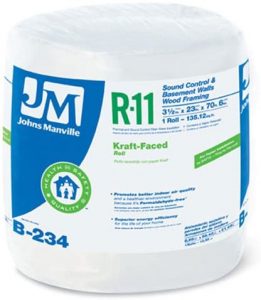
The Johns Manville R11 is another fantastic fiberglass insulation to consider. It measures 23 inches by 70 feet and 6 inches. The insulation is flexible, so you can put it in smaller spaces, and you can cut it to fit more easily
You can fit the insulation in the rafters above your basement, so you don’t have to worry about finishing the ceiling. It’s also thin enough to fit in a ceiling that’s 2×4. The roll can help with soundproofing and thermal insulation, and it can also improve the quality of the air in your home.
With an R-value of 11, it’s not the most temperature insulating, but it can work well with temperatures as low as 20°, which can come in handy if you need to store electronics or other sound equipment.
Now, one roll of the stuff is a bit more expensive than other insulation. But you get a good amount of it with the roll, so you shouldn’t need a second one unless you have a large basement.
M-D Building Products Fiberglass Pipe Wrap
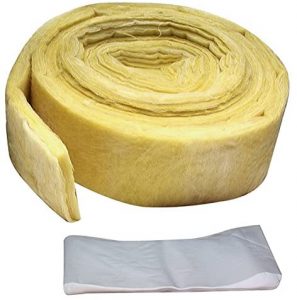
If you need some extra insulation to cover the pipes above your basement, consider the Fiberglass Pipe Wrap from M-D Building Products. The fiberglass works specifically to cover and insulate any pipes, which can be useful if you have some exposure.
You can use the pipe wrap with another type of fiberglass insulation to make sure that you don’t miss any spots. Then, you can make sure to cover the entire basement ceiling with insulation. Like other insulation, you can cut it to fit in whatever space you use it, and you can form it to fit around your pipes.
One roll measures 25 inches by 3 feet, and it’s about half an inch thick. It’s also easy to install, so you can set it up yourself.
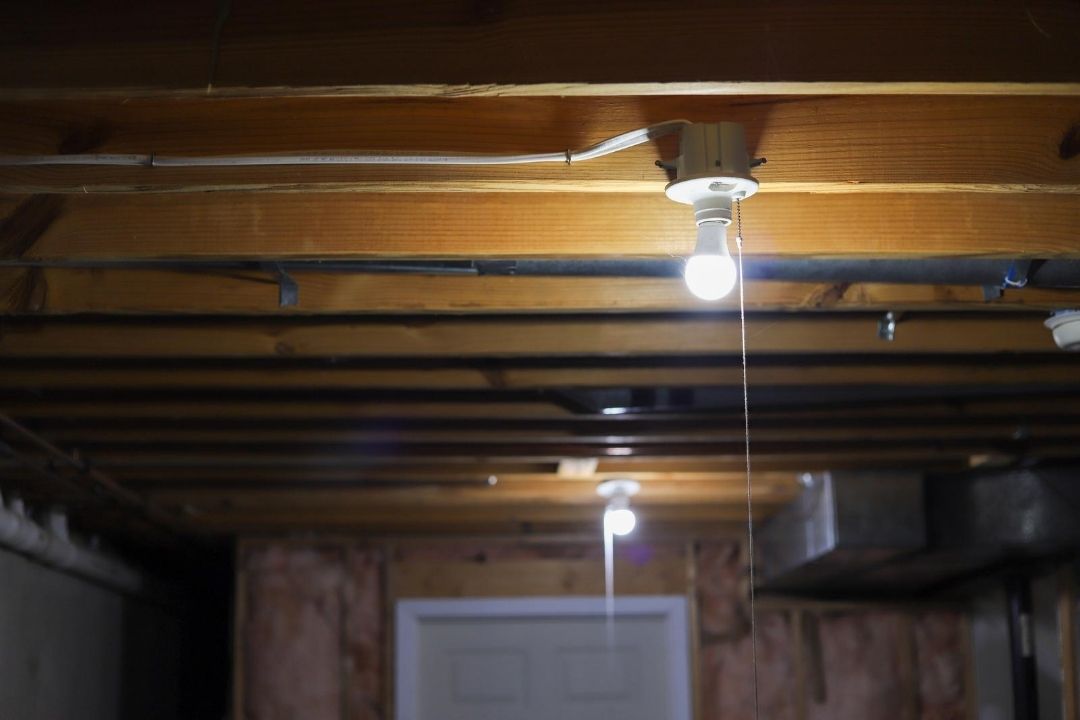
Conclusion
Insulation is an excellent tool for soundproofing your basement ceiling, but you need the right type. Fiberglass insulation can absorb sound while also insulating heat if necessary. Consider options from Owens Corning and Johns Manville when looking for the best insulation for soundproofing your basement ceiling.
Sources

what about using rock wool for soundproofing a basement ceiling?